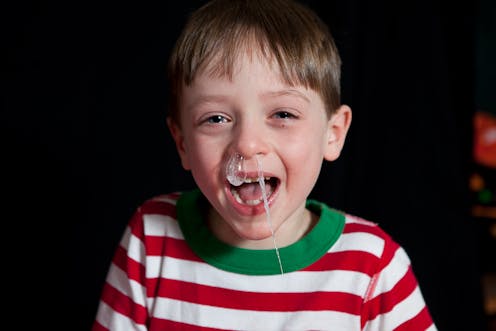Why do our noses get snotty when we are sick? A school nurse explains the powers of mucus
- Written by Kristin Ahrens, Pediatric Nurse Practitioner, Adjunct Instructor of Nursing at Purdue Global, Purdue University

Snot can come in a rainbow of yucky colors. When white blood cells are fighting an infection, they release chemicals that may turn your snot yellow[12]. When more of those cells are needed to get the job done, mucus can even turn green. Typically, after a few days, colored mucus changes back to clear and your stuffy nose will go away.
Not just in your nose
Mucus isn’t found just in your nose and lungs.
Your eyes also have a thin layer of mucus[13] that helps protect them from particles in the air. When you get sick or get an eye infection, eye mucus[14] can act the same way it does in your nose – catching and killing germs. Eye mucus can also sometimes turn thick and yellow. If that happens, you’ll want to call your health care provider. Don’t ever touch your eyes with your fingers. That can introduce more germs[15].
Your stomach and intestines also have protective mucus. If you’ve ever had an upset stomach that led to diarrhea, the mucus in your intestinal track was working overtime to help flush out bad bacteria[16]. That’s why your normal poop goes from a solid mush to something more slimy. There are other reasons you can have stomachaches – like stress, constipation or food allergies – but if you have diarrhea, your mucus is definitely hard at work.
Animals have it too
Humans aren’t the only animals that use mucus. For example, dogs and cats have mucus[17] too.
Parrotfish[20], wrasses[21] and other sea creatures[22] produce mucus cocoons to help protect them from predators at night.
Chameleons use the sticky mucus on the end of their tongues[23] to reel in their prey. Earthworms secrete mucus to help them move through the soil, which in turn benefits the soil[24].
In humans, mucus helps neutralize and eliminate the microbial bad guys. So the next time you reach for a tissue to blow your nose, remember: Your body’s natural defenses are doing their best to keep you healthy or make you better. Just think of all that snot as one of your body’s superpowers.
Hello, curious kids! Do you have a question you’d like an expert to answer? Ask an adult to send your question to CuriousKidsUS@theconversation.com[25]. Please tell us your name, age and the city where you live.
And since curiosity has no age limit – adults, let us know what you’re wondering, too. We won’t be able to answer every question, but we will do our best.
References
- ^ Curious Kids (theconversation.com)
- ^ curiouskidsus@theconversation.com (theconversation.com)
- ^ teaches nursing (stories.purdue.edu)
- ^ continuously creates mucus (www.everydayhealth.com)
- ^ water, proteins and salts (www.britannica.com)
- ^ stop bacteria from banding together (www.nibib.nih.gov)
- ^ kill the invaders (doi.org)
- ^ proteins and genes in mucus (doi.org)
- ^ expand the blood vessels (my.clevelandclinic.org)
- ^ Children's National Hospital (riseandshine.childrensnational.org)
- ^ CC BY-NC-SA (creativecommons.org)
- ^ turn your snot yellow (www.healthline.com)
- ^ eyes also have a thin layer of mucus (theconversation.com)
- ^ eye mucus (www.verywellhealth.com)
- ^ introduce more germs (www.nyoph.com)
- ^ flush out bad bacteria (doi.org)
- ^ dogs and cats have mucus (petriage.com)
- ^ RobertoCostaPinto/WikiMedia Commons (commons.wikimedia.org)
- ^ CC BY-SA (creativecommons.org)
- ^ Parrotfish (www.montereybayaquarium.org)
- ^ wrasses (doi.org)
- ^ other sea creatures (cimi.org)
- ^ mucus on the end of their tongues (www.nationalgeographic.com)
- ^ benefits the soil (doi.org)
- ^ CuriousKidsUS@theconversation.com (theconversation.com)
Authors: Kristin Ahrens, Pediatric Nurse Practitioner, Adjunct Instructor of Nursing at Purdue Global, Purdue University

